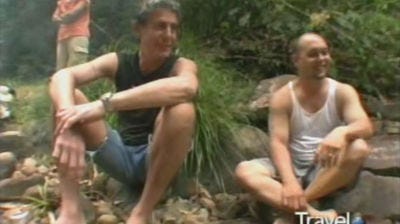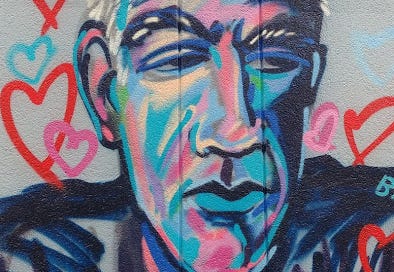
If you’re a new subscriber, welcome! If you’re an old subscriber that forgot the original purpose of this newsletter, that’s fair because I haven’t written in two months!
I’m slowly rewatching every episode of Anthony Bourdain: No Reservations then using that as a jumping-off point to write reviews that turn into essays about random stuff. Eventually I hope to make it to Parts Unknown, but at the rate that I’m going, that might be when I retire (assuming there’s still an Internet/functional planet by then).
I watched this episode two months ago then promptly procrastinated writing an essay about it so this isn’t my best work, but I feel like I need to get it out so I can force myself to move on to the next episode.
Anyways, here’s Anthony Bourdain and Malaysia.
Anthony Bourdain was a master of saying nothing at all. Oh, he talked to us through our TV screens for 16 years and through four different TV shows. He was a master of saying things in a very beautiful way—let’s not forget that for all the noise about him being a chef and television personality, he considered himself a writer, first and foremost. If you’re interested in food and travel, especially if you’re pretentious about it, you can probably quote one of his beautiful turns of phrase about the places he visited, or one of his sarcastic one-liners.
Anthony Bourdain talked a lot, but he didn’t always say much. Sincerity seemed to be difficult for him. Incredible poverty or incredible views? Better to undercut the situation with a wisecrack (there’s a reason a few of my newsletter editions have a section dedicated to what he mocked in each episode) or a self-deprecating joke about his own assholeness (which recent interviews with his crew members seem to show were closer to the truth than many of us fans may like to admit).
That’s not to say he was a bullshit artist. As his longtime director and producer Tom Vitale points out, much of Tony’s shows excelled in that they peeled back the surface layer on the TV-making process. However, he had a harder time peeling back the layers of his own personality and unleashing the vulnerability that hid beneath the sarcastic exterior. He clashed with the crew when someone suggested nice happy endings.
Which is why it is so surprising when those moments shine through in this episode in season 1 of No Reservations, when Anthony Bourdain goes to Malaysia. The highlight of the episode is not even Bourdain getting a tattoo on-camera, the first in a long line of episodes that let viewers watch his body get put through the wringer for the sake of good TV, but his visit to the Iban people of Borneo.
Anthony frames the episode around the Iban concept of the bejalai, a coming-of-age ritual where young men must travel into the world to acquire social standing.1It is a journey rich with meaning, one that forms the youth into the person he will be as an adult. Towards the end of the episode, Tony notes, “Did I go on my own bajelai or is it just another week as a Flying Dutchman TV host?” It’s a hint of dissatisfaction at the comparatively meaningless nature of some of his own travels. He provided entertainment, he provided culture, but he also provided a hell of a lot of air pollution parachuting from one location to the next. And as many of his collaborators have suggested, nobody travels that much for over a decade unless they are also running from something back home. To many of us, his lifestyle may have seemed aspirational, but rewatching some of his episodes makes the unhappiness palpable.
It may not have been a bajelai, but this episode did change him. In later interviews, Bourdain credits his time with the Iban with saving his life at a very difficult time. I’m not going to speculate what it is about the trip that gave him the strength to keep pushing, but the look of awe and wonder on his face throughout the later half of the episode is palpable.
Throughout this episode, Anthony Bourdain is forced to realize just how small he is in the face of the planet, starting with his trip to a Hindu temple, going through his time in the jungle all the way to the ritual feast. At times it makes him uncomfortable. At the temple, he tries to quip, “I feel inadequate around fervent believers, like a snake in the grass, a turd in the punch bowl,” but the inferiority in the sentiment shines through even though he tries to wrap it in his regular obscene metaphors.
Either he or the producers did their best to wrap this episode in even more cliches than usual. There’s the obligatory comments about how Malaysia is “a land of natural fusion” (you can say that about many places), the scenes of ritual self-harm at the temple added for shock value, and his usual quips. But beneath the schlocky attempts at getting gawking American eyeballs to watch the episode, actual sincerity shines through.
Tony’s face every time he’s forced to say something sincere looks pained, awkward (at least until he can fill the gap with a dirty joke). Sincerity seems to be hard for him. He’s used to living his life on camera, but won’t bare his soul for us (and it seems invasive to even ask). From interviews with friends, it seems as if he struggled with that in real life as well.
Sincerity is something I’ve been thinking about a lot lately. I’ve been thinking about the ways that certain segments of the online left seem to view sincerity as cringe (I’ve noticed this a lot with the Zagreb left in particular but that’s an essay for another day). Constantly clinging to irony and detachment seems exhausting. I don’t think I could do it.
Sincerity is hard. It’s a lot easier to be ironic and detached. Sincerity requires admitting that you give a shit. Irony gives you plausible deniability. But it’s also boring.
So today I’m going to try to live my life with a bit of sincerity. If the world’s most jaded travel show host could try it, so can I.
What Tony Ate:
Kuala Lumpur street market: fermented shrimp, jackfruit cooked in coconut milk, steamed buns, banana flower in anchovy sauce
Sup Torpedo Campur (during a very bro-y segment about natural aphrodisiacs)
“Place Under the Big Tree” roadside restaurant: steamed carp head
Aunty Aini’s Garden Cafe: whole spread including curry and lemongrass appetizer, fern salad, and roasted beef
Kuching: Laksa for breakfast
With the Iban: fresh heart of palm, fish, rice and veggies steamed in bamboo, pig-centered feast
What Tony Did:
peeled a leech off a crew member’s butt
visited the Batu caves, a Hindu pilgrimage site
got a tattoo from Eddie David, an Iban tattoo artist
visited an Iban village in Borneo
hung out with a former Sarawak Ranger
tries spearfishing
kills a pig in traditional guest ritual
What Tony Mocked:
his fixer in Kuala Lumpur
the name “steamed buns” (“it’s like a porn title”)
George Harrison
Martha Stewart
Alicia Keys
Britney Spears (not a good episode for celebrities)
his own tolerance for spicy food
Thanks for reading. The next episode is Sicily, which will hopefully be easier to write because I’ve actually been there. Knowing my consistency, expect that sometime in January or whatever.
If my explanation of this concept is imperfect, I apologize. I tried to do it justice based on what I understood from the TV show and some basic Internet research, but of course I’m not Iban myself.

